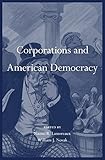Corporations and American democracy / edited by Naomi R. Lamoreaux, William J. Novak.
Material type: TextLanguage: Spanish Publisher: Cambridge, Massachusetts : Harvard University Press, [2017]Description: viii, 517 pages : illustrations ; 25 cmContent type:
TextLanguage: Spanish Publisher: Cambridge, Massachusetts : Harvard University Press, [2017]Description: viii, 517 pages : illustrations ; 25 cmContent type: - text
- unmediated
- volume
- 9780674972285 (hardback)
- 346.73/066609 23
- KF1384 C822 2017
| Item type | Current library | Home library | Collection | Shelving location | Call number | Copy number | Status | Date due | Barcode |
|---|---|---|---|---|---|---|---|---|---|
 Libro
Libro
|
Biblioteca Juan Bosch | Biblioteca Juan Bosch | Humanidades | Automatización y Procesos Técnicos (1er. Piso) | KF1384 C822 2017 (Browse shelf(Opens below)) | 1 | Available | 00000132503 |
Includes bibliographical references and index.
Early American corporations and the state / by Eric Hilt -- Corporations and organizations in the United States after 1840 / by Jessica Hennessey and John Wallis -- The dissociation of incorporation and regulation in the progressive era and the New Deal / by Daniel A. Crane -- The public utility idea and the origins of modern business regulation / by William J. Novak -- Corporate taxation and the regulation of early twentieth-century American business / by Steve A. Bank and Ajay K. Mehrotra -- From fiscal triangle to passing through : rise of the nonprofit corporation / by Jonathan Levy -- The Supreme Court's view of corporate rights : two centuries of evolution and controversy / by Margaret M. Blair and Elizabeth Pollman -- Corporations and the Fourteenth Amendment / by Ruth H. Bloch and Naomi R. Lamoreaux -- Two cheers for vertical integration : corporate governance in a world of global supply chains / by Nelson Lichtenstein -- Citizens United, personhood, and the corporation in politics / by Adam Winkler.
"The Supreme Court's decision in Citizens United v. Federal Election Commission has provoked passionate debate about the proper role of corporations in American democracy, among academics and also among the wider community of concerned citizens. As the essays in this volume demonstrate, there is absolutely no justification for basing present-day decisions on originalist interpretations of the Constitution. Not only did the framers themselves hold conflicting views of corporations but the relationship between corporations and American democracy has shifted and evolved over the course of American history. The changes that underpin recent debates over Citizens United and the role of corporations in American society are of relatively recent origin. This volume makes it possible to understand them in the context of the complex ways in which America's multi-layered, federated polity wrestled with the problem of corporate power and possibility in the past"-- Provided by publisher.


There are no comments on this title.